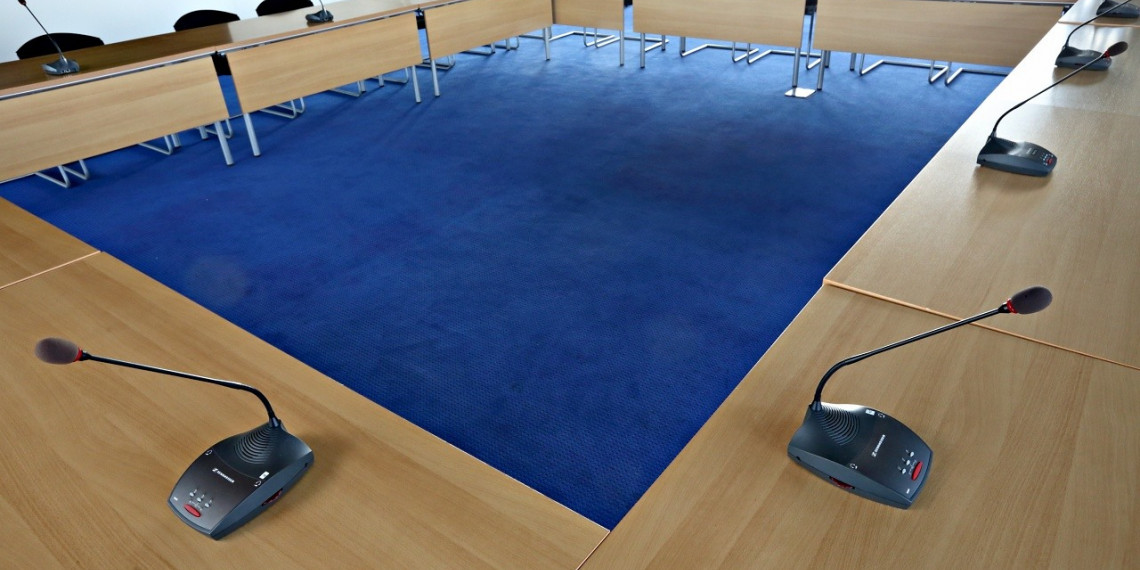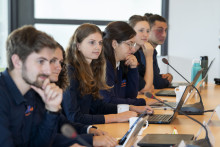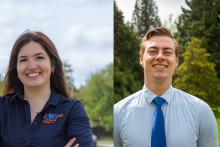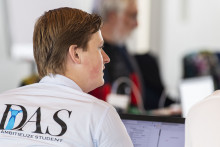Vincent Witmond, Partij van de UT: ‘No pseudo-participation’
Witmond (Industrial Engineering Management master) has nearly finished his first year in the university council and is standing for a second term. ‘If I am re-elected, I hope to be in a better position this year as far as file knowledge is concerned’, he says. ‘When you’re new, you realise you are playing catchup. I want to bring the experience and knowledge I have gained over the last year, also to guide the other student sections.’
‘Meaningful content and tenacity, that is what the voters deserve’
 Top of Witmond’s plan of action is the EER, the Education and Examination Regulation. This includes a provision that TOM modules consist of 15ec and are not divisible in principle. Witmond calls this unfair and unjust for students. ‘The Executive Board recently maintained the 15-ec-all-or-nothing rule once again, so that there will be no changes for the upcoming academic year. Despite years of the university council supplying sound, substantive arguments to abolish it. This absolutely has to change next year.’
Top of Witmond’s plan of action is the EER, the Education and Examination Regulation. This includes a provision that TOM modules consist of 15ec and are not divisible in principle. Witmond calls this unfair and unjust for students. ‘The Executive Board recently maintained the 15-ec-all-or-nothing rule once again, so that there will be no changes for the upcoming academic year. Despite years of the university council supplying sound, substantive arguments to abolish it. This absolutely has to change next year.’
According to Witmond, this substantive example aligns with his party’s main mission during this round of elections. ‘We want to make it clear to the UT community that as a party, we practice pure participation. We prioritise content and tenacity, that is what the voters deserve.’
‘As soon as we are not being taken seriously, we stop participating in the discussion’
So, the party is adamant the Executive Board will not force them as much this year. ‘As soon as we are not being taken seriously, we stop participating in the discussion’, according to Witmond. ‘To illustrate, our fraction walked out of a meeting over a year ago because our chairman Dick Meijer was treated improperly by the Executive Board. This is not how we treat each other, we want to be clear on that. I think our party’s strength is the courage to broach sensitive subjects and be outspoken about them. The UT community should know we will not go along with pseudo-participation. And it’s good for everyone within the community to think about the fundamental elements of the participation.
At the same time, Witmond is the only student on the next election’s voting list of the party, a mix between students and staff. ‘Last year I was supported by two others on the list and I managed to gain a seat. And my constituency is less clear cut than those of UReka and DAS. But still, I hope to be on the council again.’
University Council debate
A public debate with all parties who can be elected for the University Council. U-Today and Studium Generale organize this event. Everybody is welcome, free lunch included. During 45 minutes the parties will talk about various topics, like language, TOM or work pressure. Dutch can also be spoken, so don't be afraid to participate. Monday the 28th of May, 12.45-13.30 PM. Bad weather? Ravelijn will be the alternative.
Hidde Zijlstra, DAS: ‘Creating space for ambition’
First-year IBA student Hidde Zijlstra is a newcomer on the DAS list and is at the top already. He is currently on the board of De Ambitieuze Student, the ambitious student, as the party is called in full. ‘So, I am already fully aware of the ins and outs of the group and the council.’
‘This is a fantastic university, but the educational model simply doesn’t suit me’
 As such, the discussion on the EER has not escaped Zijlstra. ‘Our party was established in 2015 with the aim of making modules divisible. Now, this still hasn’t changed, although we are constantly saying: “Give students the trust and the freedom to organise their own education.” And I notice it too, as a first-year student. This is a fantastic university, but the educational model simply doesn’t suit me.’
As such, the discussion on the EER has not escaped Zijlstra. ‘Our party was established in 2015 with the aim of making modules divisible. Now, this still hasn’t changed, although we are constantly saying: “Give students the trust and the freedom to organise their own education.” And I notice it too, as a first-year student. This is a fantastic university, but the educational model simply doesn’t suit me.’
Zijlstra says that his party supports cohesive modules. ‘But the disadvantage is that it brings obligations. It’s a roadblock for activism, because it complicates things if you want to get involved in something besides your study. I think the move to divisible modules would be a massive step. We really have to take the lead on that for the next academic year, to create space for ambition.’
‘You are not here as the opposition, but to participate in the thought process on UT policy’
Above all, the DAS top of the list candidate calls for safeguarding of the quality of education. But there are other issues that require attention. For instance, he believes that not everyone is ready for English as lingua franca on campus, and he wants to see a clear division between curricular and extracurricular languages (‘We have to have a proper discussion about this’). Zijlstra also wants to see clearer communication from the UT, for example on sustainability and (psychological) help for students. The party wants official recognition for activism - a counterpart of the ‘plusdocument’ issued to VWO (pre-university) students - which would be added to the diploma received by UT graduates.
To arrange these matters, Zijlstra - if he is elected to the council - wants to adopt a constructive attitude towards the Executive Board. ‘We are obliging and considerate, to a degree. You are not here as the opposition, but to participate in the thought process on UT policy. That is my personal motivation for being part of the participation: not just self-development, but also from an ideological standpoint. How great is it to look back and know that you’ve contributed to a better university?’
Johanneke ten Broeke, UReka: ‘Honesty and equality’
‘Students’ experiences are crucial for policy’, says UReka first candidate Johanneke ten Broeke (technical medicine). ‘I noticed this on the education committee and this next academic year I want to put my stamp on UT as a whole.’
‘Students are good at noticing whether they are being treated fairly or not’
 Like the other student first candidates, Ten Broeke cannot escape the well-known sore point, EER. ‘We are absolutely in favour of integration of subjects within modules, it will improve quality. But if a segment is not integrated properly, it will clearly not work.’
Like the other student first candidates, Ten Broeke cannot escape the well-known sore point, EER. ‘We are absolutely in favour of integration of subjects within modules, it will improve quality. But if a segment is not integrated properly, it will clearly not work.’
UReka will certainly work on the motto ‘abandon the indivisibility of modules’ during the coming academic year. Particularly because there are differences between the courses on whether partial results are upheld or not. ‘Students are good at noticing whether they are being treated fairly or not’, says Ten Broeke. ‘This is why we fight for honesty and equality for all students.’
Equal opportunities should also be an extracurricular issue, says the first candidate for UReka. ‘Self-development is very important in tandem with your studies. This is why we want to build bridges to include the non-active students. International students, for example, are more able to get involved with activism, and we should make them aware of that fact. They are often worried about study delay, but small-scale activism such as committee work only adds a few hours to your studies.’
‘Everyone is different, but everyone deserves equal opportunities to participate’
There are more pressing issues on Ten Broeke’s agenda. Such as the use of the English language (‘as an international course, this should be comprehensive’), evening lectures (‘unavoidable in the short term, but these should stop as soon as possible’) and sustainability (‘incredibly important to keep in mind for policy-making’). How stalwart is the party? ‘Fundamentally, we want to be proactive and work towards solutions with the Executive Board on the basis of mutual trust.’
Ten Broeke is aware that she will represent about ten thousand students, if she makes it onto the council. ‘Everyone is different, but everyone deserves equal opportunities to participate’, she emphasises. ‘And it’s important to fight for that on the university council. The council is a reflection of all UT students, everyone should feel represented.’
All the more reason she hopes for a high turnout. Last year, with 41.49 percent, was the highest in more than 20 years. ‘At the same time, that means around 60 percent of students did not vote. So why is that? After all, it takes very little effort.’







